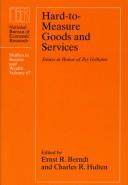| Listing 1 - 2 of 2 |
Sort by
|

ISBN: 9780226044491 0226044491 9786612069567 128206956X 0226044505 9780226044507 6612069562 Year: 2007 Publisher: Chicago University of Chicago Press
Abstract | Keywords | Export | Availability | Bookmark
 Loading...
Loading...Choose an application
- Reference Manager
- EndNote
- RefWorks (Direct export to RefWorks)
The celebrated economist Zvi Griliches's entire career can be viewed as an attempt to advance the cause of accuracy in economic measurement. His interest in the causes and consequences of technical progress led to his pathbreaking work on price hedonics, now the principal analytical technique available to account for changes in product quality. Hard-to-Measure Goods and Services, a collection of papers from an NBER conference held in Griliches's honor, is a tribute to his many contributions to current economic thought. Here, leading scholars of economic measurement
Econometrics --- Econometrics. --- Income distribution --- Income distribution. --- Griliches, Zvi --- Griliches, Zvi. --- Business & Economics --- Economic Theory --- Griliches, Zvi, --- Grilliches, Zvi, --- E-books --- essay collection, anthology, zvi grilches, economics, economy, economist, well known, famous, influential, finance, financial, wealth, money, income, career, life story, oeuvre, accuracy, measurement, technical, technology, quality, analysis, analytical, products, production, conference, postmortem, thought, thinker, intellectual, academic, scholarly, productivity, price, hedonics, capital, sector.
Book
ISBN: 1283163748 9786613163745 1400836808 069113507X 0691135061 9780691135069 9780691135076 9781400836802 Year: 2011 Publisher: Princeton, NJ
Abstract | Keywords | Export | Availability | Bookmark
 Loading...
Loading...Choose an application
- Reference Manager
- EndNote
- RefWorks (Direct export to RefWorks)
Most theories of elections assume that voters and political actors are fully rational. While these formulations produce many insights, they also generate anomalies--most famously, about turnout. The rise of behavioral economics has posed new challenges to the premise of rationality. This groundbreaking book provides a behavioral theory of elections based on the notion that all actors--politicians as well as voters--are only boundedly rational. The theory posits learning via trial and error: actions that surpass an actor's aspiration level are more likely to be used in the future, while those that fall short are less likely to be tried later. Based on this idea of adaptation, the authors construct formal models of party competition, turnout, and voters' choices of candidates. These models predict substantial turnout levels, voters sorting into parties, and winning parties adopting centrist platforms. In multiparty elections, voters are able to coordinate vote choices on majority-preferred candidates, while all candidates garner significant vote shares. Overall, the behavioral theory and its models produce macroimplications consistent with the data on elections, and they use plausible microassumptions about the cognitive capacities of politicians and voters. A computational model accompanies the book and can be used as a tool for further research.
Elections. --- Voting --- Behaviorism (Political science) --- Behavioralism (Political science) --- Behaviouralism (Political science) --- Behaviourism (Political science) --- Political psychology --- Polls --- Elections --- Politics, Practical --- Social choice --- Suffrage --- Electoral politics --- Franchise --- Political science --- Plebiscite --- Political campaigns --- Representative government and representation --- Psychological aspects. --- Political systems --- Social psychology --- Condorcet winner. --- Downsian party competition. --- Duverger's Law. --- Markov chain. --- Pareto dominance. --- adaptation. --- aspiration-based adaptation. --- aspiration-based adaptive rule. --- aspiration-based adjustment. --- aspirations. --- bandwagon effect. --- behavior. --- behavioral theory. --- bounded rationality. --- candidates. --- computational model. --- decision making. --- election voting. --- elections. --- equilibrium behavior. --- faction size. --- framing. --- game-theoretic model. --- hedonics. --- heuristics. --- incumbent. --- majority faction. --- multiparty elections. --- parties. --- party affiliation. --- party competition. --- payoffs. --- platforms. --- political parties. --- politicians. --- population size. --- propensity. --- rational choice theory. --- rational choice. --- rationality. --- retrospective voting. --- satisficing. --- search behavior. --- stochastic process. --- turnout. --- two-party elections. --- voter choice. --- voter coordination. --- voter participation. --- voter turnout. --- voters. --- Balloting
| Listing 1 - 2 of 2 |
Sort by
|

 Search
Search Feedback
Feedback About UniCat
About UniCat  Help
Help News
News